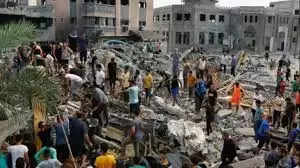Risk analysis of epidemics

Human-induced wars result in famine due to a short supply of food, pollution of water and lack of sanitation, which leads to diseases in some cases.
Influenza, Typhoid, Dengue, Malaria and Hepatitis are some familiar monsoon related diseases. The infrastructure facilities available in the country are not adequate to meet the peak demand for medical services required in the event of an outbreak of epidemics.
Thankfully, a situation of unprecedented scale arose because the Covid -19 had not been aggravated by rain. Rain has been the major cause of epidemics in the history of humanity. Cholera outbreaks are mainly due to flooding of dirty water during rainy seasons.
Scarcity of water or its pollution could trigger epidemics. Degradation of the environment and disintegration of waterways and water resources have been the reasons for the problems perennially.
Epidemics could be human-induced by intention or ignorance. Human-induced epidemics could be caused by anti-national or terrorist forces with nefarious plans.
"According to a study published in the Journal of Risk Analysis, a pathogenic organism may be genetically edited or created by synthetic biotechnology... The study also warned that biological attacks can be directed against large heterogeneous population groups and military contingents or against selected target groups." ('New tool to help determine if an epidemic is natural or manmade,' PTI, Deccan Herald, March 27, 2020)
Perhaps artificial release of biological agents by external forces to create havoc in a country or countries would be a challenge to deal with in the coming days for governments.
The impact of epidemics on the economy and its effect on the morality of society could be colossal. The epidemics could hamper the growth and development of the economy in thickly populated large countries like China, India, USA, Indonesia and Malaysia.
The fear and terror caused by epidemics in vulnerable communities or sections of society are compounded due to poverty. They don’t know what their priority is! The food for the day or medicine for the cure! What should they do with the near and dear ones who are required to be isolated to avoid the spread of infection?
When disasters like floods and cyclones are localized, the government can act swiftly and efficiently. The important issue at the time of epidemics spreading all over the country is handling of an impossible situation. No government can be fully prepared at all times to provide treatment and solace to the people under epidemics on a national level at an unprecedented scale. Everyone blames everyone else for their misfortune.
There are conspiracy theories spreading like viruses, thanks to social media.
When people spend relatively more time at home with their families, the domestic environment changes completely and the bread-winner finds it difficult to cope with the domestic situation throughout the day. It sometimes causes friction within the family, since the ‘invisible veil’ existing between the family members is brought down completely, as there’s no place to escape.
Beliefs, notions and assumptions about the people within the family and business are all washed out under lockdown. Values in society are revalued by the people when there is nothing available to fall back on. The Covid -19 exposed the frailty and fragility of not only our economic system but also companies.
It’ll take a long time for the wounds to heal, but the scars remain in society eternally for the people of this generation.
The number of Covid -19 cases and fatalities in Japan is significantly lower compared to the rest of the world. There’s a conspiracy theory doing rounds here as well – “deliberately kept low in view of the Olympic Games.”
- Wearing masks and adopting social distancing is natural in their culture.
- Conversation in crowded places like trains is poor etiquette.
- Social formalities such as shaking hands, hugging and kissing are not the way of their greetings.
The learning point is that the Japanese are the true social animals. They have built a very strong and sound social system with high social responsibility of the citizens.

